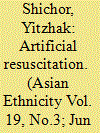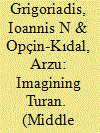| Srl | Item |
| 1 |
ID:
158092


|
|
|
|
|
| Summary/Abstract |
Pan-Turkism emerged in the middle of the 19th century as an attempt to uniting all Turkic people along the Silk Road from the Mediterranean to China. After the ascent of modern Turkey under Mustafa Kemal as well as the Soviet incorporation of Central Asia, pan-Turkism had practically withered – although apparently not as an ideology. Indeed, the collapse of the Soviet Union and the subsequent independence of the Central Asia republics have provided for the revival of the pan-Turkism vision, perceived by Beijing as a threat not only to its interests in Central Asia but, moreover, to Xinjiang’s internal stability and China’s sovereignty. While this vision could hardly be accomplished, China’s intensive preoccupation with pan-Turkism has facilitated its artificial resuscitation, though it appears already deceased. Xi Jinping’s One Belt One Road initiative aims, among other things, at blocking pan-Turkism.
|
|
|
|
|
|
|
|
|
|
|
|
|
|
|
|
| 2 |
ID:
174166


|
|
|
|
|
| Summary/Abstract |
While scholarly interest in the influence of Tatar intellectuals on Turkish nationalism has been strong, less attention has been paid to the interactions between Russian Azerbaijani and Ottoman Turkish intellectuals. This study applies theoretical tools developed by Benedict Anderson in the study of ethnic nationalism in the late Ottoman and Russian Empires. In doing so, this study focuses on the works of one leading intellectual from each side, Hüseyinzade Ali [Turan] and Mehmet Ziya [Gökalp]. Particular attention is paid to the concept of Turan, which they defined and elaborated as both a political ideal and a key element of the nationalist ideology they espoused through four poems they authored, two of which have homonymous titles. Their different views of the limits of the Turanian ‘imagined community’ and the political operationalization of the concept shed light on the development of ethnic nationalism in the declining Ottoman and Russian Empires. Ever since, Turan has become a significant symbolic conceptual tool that has fired the imaginations of Turkic nationalists (without, yet, having led to the establishment of a serious political movement).
|
|
|
|
|
|
|
|
|
|
|
|
|
|
|
|